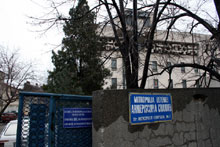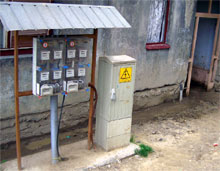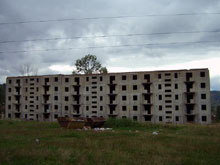STORY No.4 | ROMANIA
A Town Without Light
Romanian villages and crumbling industrial towns live without light
Romania is one of the largest exporters of power in the Balkans, but many Romanians can't afford to pay their electricity bills.
Last year, more than 330,000 households were disconnected, according to Electrica, the state energy company. In a country of 22.6 million people where one in four lives in poverty, electricity prices are going up too, so even more seem likely to be plunged into darkness.
Especially hard-hit are neighborhoods on the outskirts of Romania's decaying industrial cities, including Bucharest, and rural villages where whole neighborhoods are without power.
A town without light
The Holy Power
Romanian Orthodox Church owns energy trading company
As Romanians struggle to pay increasingly higher electricity bills, one of the many companies earning profits as an energy trader is partly owned by the Romanian Orthodox Church – an organization that professes to help the poor.
On the list of companies approved by the Romanian Energy Regulatory Authority to trade energy includes Elcomex IEA SA(link), a company from Cernavoda, near the Black Sea and the site of the only Romanian nuclear power plant.

Archdiocese of Craiova
Company records show that five individuals and two companies hold shares in Elcomex. The two companies are Praxis SRL and Seaf Trans-Balkan Romania Fund LLC. Seaf is registered in the U.S. state of Delaware, while Praxis is a Romanian company listed on Karl Marx Street in the southern Romanian town of Craiova.
Only one Praxis is registered in Craiova and its owner is: the Archdiocese of the Craiova Orthodox Church Archdiocese. Praxis lists its place of operation at the same address as the Mitropolit Firmilian, the church’s main office. The church, through Praxis, owns almost 13 percent of Elcomex, a company with a 2005 turnover of about €15 million.
Priests and Brokers
The administrator of Praxis, Rev.Valentin Racovita, confirmed the church’s ownership of Praxis and its investment in Elcomex.
“Praxis bought shares of the company Elcomex IEA through brokers to get additional profit and for attracting other financial resources for the religious pilgrimages, the main activity of Praxis,” he said.
Racovita said he was very satisfied with the business and the income is quite nice. But he declined to say how much the church is making, and the Ministry of Finance does not have a record of any income.
Rev. Constantin Stoica, the Orthodox Church spokesperson, was surprised when asked to comment on this matter.
“What does the Church have to do with energy?” Stoica asked.
He asked for a few hours to investigate, and then said the business is completely legal because the money Praxis makes is used to sponsor pilgrimages and a religious radio station in Craiova. He said the church has no policy on what businesses churches can invest in.
Copsa Mica was once a thriving industrial town of 10,000 in the foothills of Transylvania. It boasted two industrial plants: Carbosin, a maker of carbon black which is used in dies and Sometra, a smelter. The companies were the town's largest employers and biggest problems. Copsa Mica had the dubious distinction of being the most polluted town in Europe. With its outdated equipment, Carbosin alone dumped more than one ton of soot an hour on the town. Sometra poisoned the town, animals and fields with lead, zinc and cadmium. Life expectancy in the town was six years less than the Romanian average.
A 2004 United Nations Development Program report mentiones both Sometra and Carbosin as major polluters in the Copsa Mica area.
When the state did not have money to upgrade them, the plants were started closing in 1992, leaving thousands jobless. Most workers left, going to Oltenia and Moldova and leaving behind their company apartments in a semi-deserted town. Dozens of Roma families, who had been living in wagons or in the villages near Copsa Mica, moved into the abandoned apartments.
Squatters
In front of one of the many decrepit but partially inhabited apartment complexes stands an imposing bank of electric meters. The meters, newly installed at a cost of hundreds of dollars between a swamp and a mud spring, are the only new structures in the area.
Ion Zlatar, a middle-aged man, comes out of the building holding two plastic cans and a lit cigarette. He guesses immediately his guest is a reporter because the only other people that might stop by are thieves or police officers.
“Only poor people live here. We have no jobs, no social support, no electricity, and no wood to heat ourselves,” Zlatar says. “If we go in the forest for wood, they fine us before getting any … what is there to make a living off of?”
The residents' water comes from a spring between two of the buildings that is encircled by men, children and dogs. Nobody in town has had water since the Sometra factory, which had the town's only pumping station, was closed. There is not enough money for a new one.
One for All …
On the front of the building a cable goes to a second-floor balcony and then splits to other apartments. It is the building's only electric power and the family on the second floor shares it with their neighbors.

Newly installed meters stand outside an
apartment building
“We help each other, as we can. We are humans. We haven't had electricity for years, but Marcel, who still has a good job, helps us all. And we all pay as much as we can, because we don't have much to give,” says 40-year old Maria Zlatar.
She says there are no refrigerators because that would consume too much power, but some families have a radio or television.
She appreciates the risk her neighbor Marcel is taking by allowing them the illegal connection.
“While he's away I look after his apartment, so that no one enters it. You can never be sure in this neighborhood. He's a good man. He gives us all electric power to make ends meet.”
Eight people sit in Maria's musty kitchen, which is devoid of appliances. A man leans unsteadily against a wall eating. He has just gotten back from his job hauling cement bags in a nearly village. He is paid less than $8 day, plus a glass of wine.
“He's my husband. He didn't eat anything and look, he got dizzy,” She said.
In other apartments, water damage, mold and rancid filth fill dark corridors. Most doors have no locks or even handles. Another Marcel invites reporters into his apartment, a pitch-black room damp with rain that has come through the roof.
“Who do you think is crazy to steal from us? All we have is poverty and sickness,” Marcel says.
“Relax son, they are not from the police,” Marcel assures him..
At the door is the electric cable from the second-floor neighbor.
“The power is off now; we let it on only at night, not to consume too much. If it were for some people, the light would be on even when watching TV,” Marcel says.
Elena Zlatar lives in a nearby ruin in a room filled with debris from fallen walls and ceilings and old garbage.
“This is not our apartment. We just live here. Our children and our grandchildren also live here with us,” she says.

When industry left in Romanian towns,
squatters
moved into the old appartments
Electricity is not their biggest problem.
“We eat when we have something to eat, and we are still alive. No one cares,” she says.
Elena Zlatar is too poor to even contribute to the shared line.
“We use candles at night and we use wood for the heating. We can get candles from the church and from the graveyard, but wood -- They fine us if we get firewood from the forest. Even if the branches are fallen on the ground,” she says.
The authorities
As the reporter leaves the neighborhood, a new police car stops nearby. The officer wants to know what he is doing in the neighborhood.
“We have to keep an eye on this neighborhood, because there are a lot of Roma living here. You have to make them respect you; otherwise,” he says.
The Copsa Mica town hall is deserted except for a lone clerk.
“What do you mean about them having electricity? Do they have any money to pay for it? No, they don't. And they still have to pay fines for illegal use of electricity. They are poor people, but no one can help them.” She shuts the door.